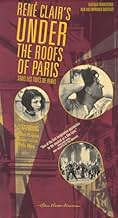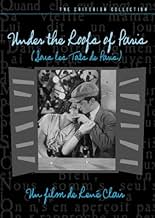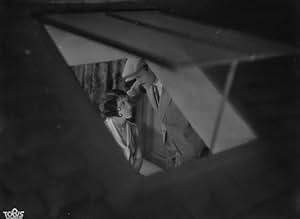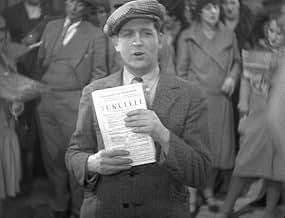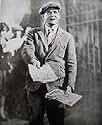AVALIAÇÃO DA IMDb
7,0/10
2,6 mil
SUA AVALIAÇÃO
Adicionar um enredo no seu idiomaAlbert is smitten for Pola but ends up wrongly committed in jail, in the meantime her affections are sought after by his friend, and on his release both love and friendship must be tested.Albert is smitten for Pola but ends up wrongly committed in jail, in the meantime her affections are sought after by his friend, and on his release both love and friendship must be tested.Albert is smitten for Pola but ends up wrongly committed in jail, in the meantime her affections are sought after by his friend, and on his release both love and friendship must be tested.
- Prêmios
- 1 vitória no total
Edmond T. Gréville
- Louis
- (as Edmond Gréville)
Delphine Abdala
- La buraliste
- (não creditado)
Raymond Aimos
- Un gars du milieu
- (não creditado)
Raymond Blot
- Un membre de la bande à Fred
- (não creditado)
Thomy Bourdelle
- François
- (não creditado)
Léon Courtois
- L'inspecteur
- (não creditado)
Édouard Francomme
- Un membre de la bande à Fred
- (não creditado)
André Michaud
- Un agent
- (não creditado)
Jane Pierson
- La dame du premier
- (não creditado)
Louis Pré Fils
- Le locataire du troisième
- (não creditado)
Eugène Stuber
- Un membre de la bande à Fred
- (não creditado)
Louis Zellas
- Le consommateur jaloux
- (não creditado)
Avaliações em destaque
The film marvellously shows the nostalgic dream of the old Paris and its common people. With melancholic irony, Clair tells a story of the milieu of backstreets and backyards, of street singers, pickpockets, fiddlers and strange townsmen. Here, his grasp into the present does not become realistic depictions of circumstances, but a poetic romance, for which reality is only one aspect of life.
In this regard, especially the sound has turned out quite well. And how hesitantly Clair used this new technical innovation! His generally critical attitude towards sound in films induced, that "Sous les toits" is mainly composed of silent parts (including many dialog scenes), which are highlighted with music or noises such as trains driving past. The song "Sous Les Toits De Paris" of Albert, the street singer, becomes to the red thread which links several scenes and bridges time distances. A fight taking place in the dark only informs the viewer through noises. For that, we witness a dispute, where the matter is uninteresting and predictable, without any sound - shot through a glass door. One can say sound is especially used for enrichment and left out when it would be needless. Thus, a film came into being that wonderfully combines sentiment, humor and intelligence with languishingly beautiful tunes.
In this regard, especially the sound has turned out quite well. And how hesitantly Clair used this new technical innovation! His generally critical attitude towards sound in films induced, that "Sous les toits" is mainly composed of silent parts (including many dialog scenes), which are highlighted with music or noises such as trains driving past. The song "Sous Les Toits De Paris" of Albert, the street singer, becomes to the red thread which links several scenes and bridges time distances. A fight taking place in the dark only informs the viewer through noises. For that, we witness a dispute, where the matter is uninteresting and predictable, without any sound - shot through a glass door. One can say sound is especially used for enrichment and left out when it would be needless. Thus, a film came into being that wonderfully combines sentiment, humor and intelligence with languishingly beautiful tunes.
I'd be lying if I said this didn't surprise me a little bit. In various ways it is, in turn, clever, novel, well done and brilliant, but also sometimes a tad uneven. René Clair's orchestration of shots and scenes as director is outstanding and often kind of ingenious, and the cinematography of Georges Périnal and Georges Raulet could hardly be more vivid and lovely; these are the first facets to catch our attention, in fact. There's also no mistaking how wonderfully crisp the image is on a basic level, and clearly this benefited from preservation efforts that some of its contemporaries didn't enjoy. It also stands out as one of the earliest sound pictures to come out of France, and more than that, Clair dallies with sound in a very playful, atypical manner - declining innate audio at many points underneath the original music, at others possibly spotlighting some sounds and not others that would coincide with action on-screen, and then still using some louder sounds to "cloak" softer ones and thus avoid the need to capture and reproduce every last one. All the while, it's certainly worth noting that 'Sous les toits de Paris' ('Under the roofs of Paris') is marvelously well made in all other regards, with sets, costume design, hair, and makeup that are utterly terrific. The sound design is perhaps imbalanced as it presents, but under the circumstances I think we can forgive the slight deficiency.
The writing is another matter in some measure. By all means, the story is compelling, and ultimately enjoyable and strongly satisfying as a viewer. Broadly speaking the scene writing, dialogue, and characters range from suitable to flesh out the tableau, to excellent. I think this suffers a bit in the details, however. As it happens, like another early French talkie released in 1930, Augusto Genina's 'Prix de beauté,' I think this title has a problem with finding the appropriate tone. 'Sous les toits de Paris' dallies with crime, romance, music, comedy, violence, and drama, and ranges from funny, to heartwarming, to inspiring, while also being unexpectedly dark and dour at new few points, including the ending. It generally seems like the feature builds strength and gels more cohesively as the runtime elapses, but the mood imparted wavers and never quite entirely feels just right. This difficulty is amplified by the peculiar directness of the storytelling, for in some cases it rather comes across that a beat or idea hasn't been meaningfully developed, and is instead just flatly introduced. When the notion of marriage is brought up, for example, it definitely doesn't seem to have received any significant treatment in the narrative, or discussion by the characters; one happily pronounces "I'm getting married," and it is just so - and the cold contrivance of such instances is exemplified in this one when their partner responds to this proclamation with a quizzical expression on their face. Suspension of disbelief takes a hit at such times.
These troubles in writing and/or execution are unfortunate, because the screenplay is mostly quite smart and solid. Clair penned a worthy, engaging tale, and everyone involved put in fine work to bring the movie to vibrant life, particularly concerning that unusual use of sound (in 1930, no less). Such quality certainly includes the cast, all giving swell performances, with Albert Préjean, Pola Illéry, and Edmond T. Gréville naturally standing out giving their prominence, but also in my opinion proving that they deserve it with the skill they demonstrate. While it's regrettable that the whole takes a while to especially come together, had the writing been tightened just a tad the end result would have benefited considerably. With all this said, though, it speaks very well to the capabilities and intelligence of all who participated in the feature's creation that it comes off as well as it does, with value that handily outweighs the weaker facets. Whatever one's impetus for watching and however one comes across 'Sous les toits de Paris' I don't think it's so essential as to fully demand viewership, but it's unquestionably deserving of recognition on its own merits. Don't necessarily feel the need to go out of your way for it, but if you have the chance to watch, this is worth exploring.
The writing is another matter in some measure. By all means, the story is compelling, and ultimately enjoyable and strongly satisfying as a viewer. Broadly speaking the scene writing, dialogue, and characters range from suitable to flesh out the tableau, to excellent. I think this suffers a bit in the details, however. As it happens, like another early French talkie released in 1930, Augusto Genina's 'Prix de beauté,' I think this title has a problem with finding the appropriate tone. 'Sous les toits de Paris' dallies with crime, romance, music, comedy, violence, and drama, and ranges from funny, to heartwarming, to inspiring, while also being unexpectedly dark and dour at new few points, including the ending. It generally seems like the feature builds strength and gels more cohesively as the runtime elapses, but the mood imparted wavers and never quite entirely feels just right. This difficulty is amplified by the peculiar directness of the storytelling, for in some cases it rather comes across that a beat or idea hasn't been meaningfully developed, and is instead just flatly introduced. When the notion of marriage is brought up, for example, it definitely doesn't seem to have received any significant treatment in the narrative, or discussion by the characters; one happily pronounces "I'm getting married," and it is just so - and the cold contrivance of such instances is exemplified in this one when their partner responds to this proclamation with a quizzical expression on their face. Suspension of disbelief takes a hit at such times.
These troubles in writing and/or execution are unfortunate, because the screenplay is mostly quite smart and solid. Clair penned a worthy, engaging tale, and everyone involved put in fine work to bring the movie to vibrant life, particularly concerning that unusual use of sound (in 1930, no less). Such quality certainly includes the cast, all giving swell performances, with Albert Préjean, Pola Illéry, and Edmond T. Gréville naturally standing out giving their prominence, but also in my opinion proving that they deserve it with the skill they demonstrate. While it's regrettable that the whole takes a while to especially come together, had the writing been tightened just a tad the end result would have benefited considerably. With all this said, though, it speaks very well to the capabilities and intelligence of all who participated in the feature's creation that it comes off as well as it does, with value that handily outweighs the weaker facets. Whatever one's impetus for watching and however one comes across 'Sous les toits de Paris' I don't think it's so essential as to fully demand viewership, but it's unquestionably deserving of recognition on its own merits. Don't necessarily feel the need to go out of your way for it, but if you have the chance to watch, this is worth exploring.
The great French film actor Jacques Tati made several films that tried to capture a Paris that disappeared even before World WarII. It was a world best seen through the gifted photography of Atget and Brassai. A world of intimacy, silent streets, virtually no traffic, limited means, but unlimited pleasures. A wonderful opening shot glides across rooftops to join a cluster of ordinary Parisians enjoying a singalong, an odd but compelling precursor of karaoke and rock concerts, but untarnished by special effects or hype. There is a sense that we are witnessing a street version of Lautrec's Moulin Rouge.
The cinematography is extraordinary. It can only be compared to Fritz Lang's "M", or the "Third Man". Very little actually happens and dialogue is used sporadically. Yet we find ourselves caring very much about the people about whom we know so little.
An unforgettable film.
The cinematography is extraordinary. It can only be compared to Fritz Lang's "M", or the "Third Man". Very little actually happens and dialogue is used sporadically. Yet we find ourselves caring very much about the people about whom we know so little.
An unforgettable film.
"Under the Roofs of Paris" is a film written and directed by René Clair. His direction is lovely--with some creative and lovely camera-work. As far as the story goes, it seems a bit thin.
The film begins with Pola being vigorously dated by Fred. In other words, the thug Fred isn't about to take no for an answer--and Pola is naturally creeped out by him. Ultimately, Fred steals her apartment key and Pola is understandably afraid to return home. When she bumps into Albert, he takes pity for her and takes her home. Over time, they fall for each other. However, Albert is arrested (thanks to his friend Emil) and Fred isn't about to allow Albert and Pola to be together. What's to come of them?
Technically, the film is a mixed bag--though I really cannot fault the film for its deficits. Although the film is part sound and part silent, films outside the United States took much longer to shift to all-talking pictures--so I accept that French films still were making the transition. Sound-wise, this 1930 film is very similar to 1927's "The Jazz Singer"--with a few songs and a bit of dialog but otherwise being essentially a silent film. However, what was very advanced was the camera work and the crane shots--they were very impressive and the film sure looked great.
Apart from the technical, the film had a story that seemed a bit weak. There isn't a lot of depth to the characters, they aren't necessarily likable and I didn't feel all that involved with them. So, overall, it is worth seeing but not a must-see--and not as good as some of the director's other efforts.
The film begins with Pola being vigorously dated by Fred. In other words, the thug Fred isn't about to take no for an answer--and Pola is naturally creeped out by him. Ultimately, Fred steals her apartment key and Pola is understandably afraid to return home. When she bumps into Albert, he takes pity for her and takes her home. Over time, they fall for each other. However, Albert is arrested (thanks to his friend Emil) and Fred isn't about to allow Albert and Pola to be together. What's to come of them?
Technically, the film is a mixed bag--though I really cannot fault the film for its deficits. Although the film is part sound and part silent, films outside the United States took much longer to shift to all-talking pictures--so I accept that French films still were making the transition. Sound-wise, this 1930 film is very similar to 1927's "The Jazz Singer"--with a few songs and a bit of dialog but otherwise being essentially a silent film. However, what was very advanced was the camera work and the crane shots--they were very impressive and the film sure looked great.
Apart from the technical, the film had a story that seemed a bit weak. There isn't a lot of depth to the characters, they aren't necessarily likable and I didn't feel all that involved with them. So, overall, it is worth seeing but not a must-see--and not as good as some of the director's other efforts.
--- this film changed my views on b&w, i first saw this when i was a wee lass of 13, awkward and shy, all i had to do with myself was watch late- night t.v. i cried so hard at the end of the film i thought for sure i'd wake my mum, thank god CBC showed it again not long after that, and like the big geek i was, and probably still am, i taped it, i liked the rawness of it, the sound wasn't very good, but it didn't matter, still doesn't, i would love to make a movie that has this same feeling the absolut "realness" i dislike the crud hollywood keeps churning out, but , the fact remains that i live in this time, and am almost forced to swallow the disgraceful porridge that is cinema. it's christmas day, i think i'll go slip on my "under the rooftops of paris" and dream of a time when film still had a heart!!
Você sabia?
- CuriosidadesThe opening sequence and the street scenes were filmed in a studio.
- Citações
Albert, a young street singer: [On seeing Pola bedding down on his bedroom floor] Okay, take the bed, I'll sleep on the floor.
- ConexõesFeatured in Les dossiers de l'écran: Boulevard du crépuscule (1969)
Principais escolhas
Faça login para avaliar e ver a lista de recomendações personalizadas
- How long is Under the Roofs of Paris?Fornecido pela Alexa
Detalhes
- Tempo de duração1 hora 36 minutos
- Cor
Contribua para esta página
Sugerir uma alteração ou adicionar conteúdo ausente

Principal brecha
By what name was Sob os Tetos de Paris (1930) officially released in India in English?
Responda


